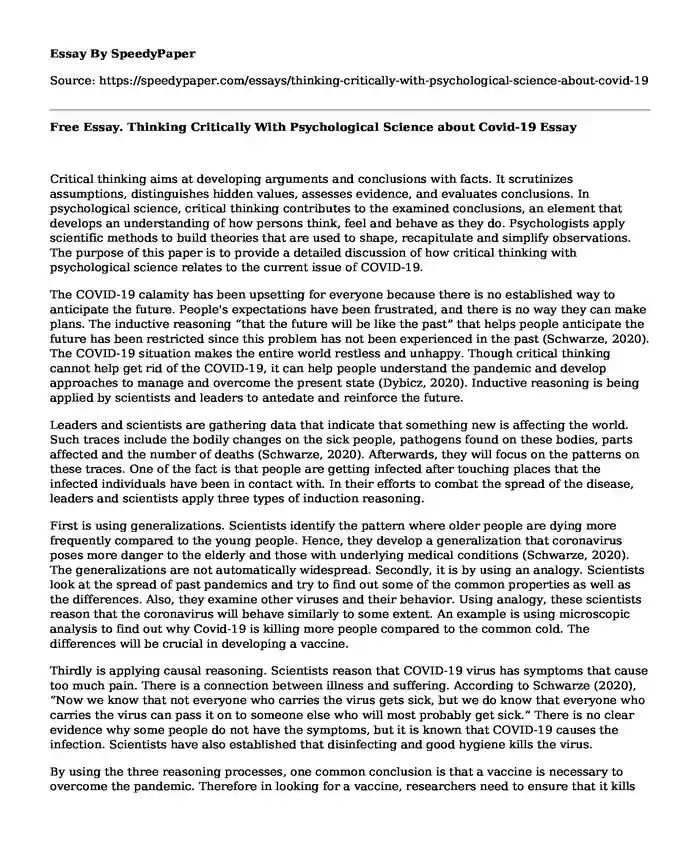
| Essay type: | Critical analysis essays |
| Categories: | Psychology Covid 19 |
| Pages: | 3 |
| Wordcount: | 620 words |
Critical thinking aims at developing arguments and conclusions with facts. It scrutinizes assumptions, distinguishes hidden values, assesses evidence, and evaluates conclusions. In psychological science, critical thinking contributes to the examined conclusions, an element that develops an understanding of how persons think, feel and behave as they do. Psychologists apply scientific methods to build theories that are used to shape, recapitulate and simplify observations. The purpose of this paper is to provide a detailed discussion of how critical thinking with psychological science relates to the current issue of COVID-19.
The COVID-19 calamity has been upsetting for everyone because there is no established way to anticipate the future. People's expectations have been frustrated, and there is no way they can make plans. The inductive reasoning “that the future will be like the past” that helps people anticipate the future has been restricted since this problem has not been experienced in the past (Schwarze, 2020). The COVID-19 situation makes the entire world restless and unhappy. Though critical thinking cannot help get rid of the COVID-19, it can help people understand the pandemic and develop approaches to manage and overcome the present state (Dybicz, 2020). Inductive reasoning is being applied by scientists and leaders to antedate and reinforce the future.
Leaders and scientists are gathering data that indicate that something new is affecting the world. Such traces include the bodily changes on the sick people, pathogens found on these bodies, parts affected and the number of deaths (Schwarze, 2020). Afterwards, they will focus on the patterns on these traces. One of the fact is that people are getting infected after touching places that the infected individuals have been in contact with. In their efforts to combat the spread of the disease, leaders and scientists apply three types of induction reasoning.
First is using generalizations. Scientists identify the pattern where older people are dying more frequently compared to the young people. Hence, they develop a generalization that coronavirus poses more danger to the elderly and those with underlying medical conditions (Schwarze, 2020). The generalizations are not automatically widespread. Secondly, it is by using an analogy. Scientists look at the spread of past pandemics and try to find out some of the common properties as well as the differences. Also, they examine other viruses and their behavior. Using analogy, these scientists reason that the coronavirus will behave similarly to some extent. An example is using microscopic analysis to find out why Covid-19 is killing more people compared to the common cold. The differences will be crucial in developing a vaccine.
Thirdly is applying causal reasoning. Scientists reason that COVID-19 virus has symptoms that cause too much pain. There is a connection between illness and suffering. According to Schwarze (2020), “Now we know that not everyone who carries the virus gets sick, but we do know that everyone who carries the virus can pass it on to someone else who will most probably get sick.” There is no clear evidence why some people do not have the symptoms, but it is known that COVID-19 causes the infection. Scientists have also established that disinfecting and good hygiene kills the virus.
By using the three reasoning processes, one common conclusion is that a vaccine is necessary to overcome the pandemic. Therefore in looking for a vaccine, researchers need to ensure that it kills the virus and not just an accident that makes people stay healthy (Dybicz, 2020). Through inductive reasoning, scientists should be able to confirm the functionality of the vaccine the same way they have confirmed that avoiding the sick and hand washing keeps people healthy.
References
Dybicz, M. (2020, March 31). Thinking clearly with Aquinas about COVID-19. Catholic Stand. https://www.catholicstand.com/thinking-clearly-with-aquinas-about-covid-19/
Schwarze, S. (2020, May 1). COVID-19 and critical thinking. Cabrini University | Live with Purpose. https://www.cabrini.edu/blog/2019-20-posts/covid-19-and-critical-thinking
Cite this page
Free Essay. Thinking Critically With Psychological Science about Covid-19. (2023, Aug 01). Retrieved from https://speedypaper.net/essays/thinking-critically-with-psychological-science-about-covid-19
Request Removal
If you are the original author of this essay and no longer wish to have it published on the SpeedyPaper website, please click below to request its removal:
- Essay Sample: Should You Get Your Child Vaccinated?
- Institutional AffiliationPlastic Water Bottle Pollution
- Psychological Effects of Cancer and Diabetes - Paper Example
- Essay Sample on Attention and Exposure
- Essay Example - Medical Coding II
- Effective Budgeting in Healthcare: Strategies & Tips - Essay Sample
- Family Planning Initiative: Benefits to US Families Under Health People 2020 - Essay Sample
Popular categories




